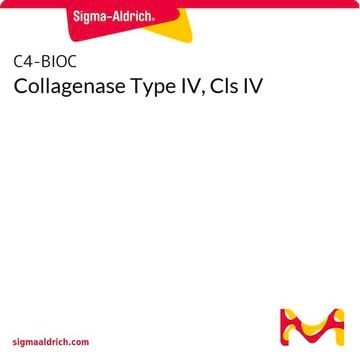C6079
Collagenase + protease inhibitor
2-5 FALGPA units/mg solid, ≥800 CDU/mg solid
Synonyme(s) :
Collagenase preparation, Protease inhibitor solution
About This Item
Produits recommandés
Source biologique
bacterial (Clostridium histolyticum)
Niveau de qualité
Forme
solid
Activité spécifique
≥800 CDU/mg solid
2-5 FALGPA units/mg solid
Poids mol.
68-130 kDa
Conditions d'expédition
dry ice
Température de stockage
−20°C
Informations sur le gène
rat ... LOC296948(296948)
Application
Actions biochimiques/physiologiques
Autres remarques
Qualité
Inhibiteur
Mention d'avertissement
Danger
Mentions de danger
Conseils de prudence
Classification des risques
Acute Tox. 4 Dermal - Acute Tox. 4 Inhalation - Acute Tox. 4 Oral - Resp. Sens. 1 - Skin Sens. 1
Code de la classe de stockage
11 - Combustible Solids
Classe de danger pour l'eau (WGK)
WGK 3
Point d'éclair (°F)
Not applicable
Point d'éclair (°C)
Not applicable
Équipement de protection individuelle
dust mask type N95 (US), Eyeshields, Faceshields, Gloves
Certificats d'analyse (COA)
Recherchez un Certificats d'analyse (COA) en saisissant le numéro de lot du produit. Les numéros de lot figurent sur l'étiquette du produit après les mots "Lot" ou "Batch".
Déjà en possession de ce produit ?
Retrouvez la documentation relative aux produits que vous avez récemment achetés dans la Bibliothèque de documents.
Les clients ont également consulté
Protocoles
To measure collagenase activity, N-(3-[2-Furyl]acryloyl)-Leu-Gly-Pro-Ala is used in a continuous spectrophotometric rate determination at 345 nm. Collagenase hydrolyzes collagen peptide bonds.
To measure collagenase activity, N-(3-[2-Furyl]acryloyl)-Leu-Gly-Pro-Ala is used in a continuous spectrophotometric rate determination at 345 nm. Collagenase hydrolyzes collagen peptide bonds.
To measure collagenase activity, N-(3-[2-Furyl]acryloyl)-Leu-Gly-Pro-Ala is used in a continuous spectrophotometric rate determination at 345 nm. Collagenase hydrolyzes collagen peptide bonds.
To measure collagenase activity, N-(3-[2-Furyl]acryloyl)-Leu-Gly-Pro-Ala is used in a continuous spectrophotometric rate determination at 345 nm. Collagenase hydrolyzes collagen peptide bonds.
Notre équipe de scientifiques dispose d'une expérience dans tous les secteurs de la recherche, notamment en sciences de la vie, science des matériaux, synthèse chimique, chromatographie, analyse et dans de nombreux autres domaines..
Contacter notre Service technique

![N-[3-(2-Furyl)acryloyl]-Leu-Gly-Pro-Ala](/deepweb/assets/sigmaaldrich/product/structures/805/876/96b5fb57-71c8-4c6b-b5d2-fafe7374cd85/640/96b5fb57-71c8-4c6b-b5d2-fafe7374cd85.png)







